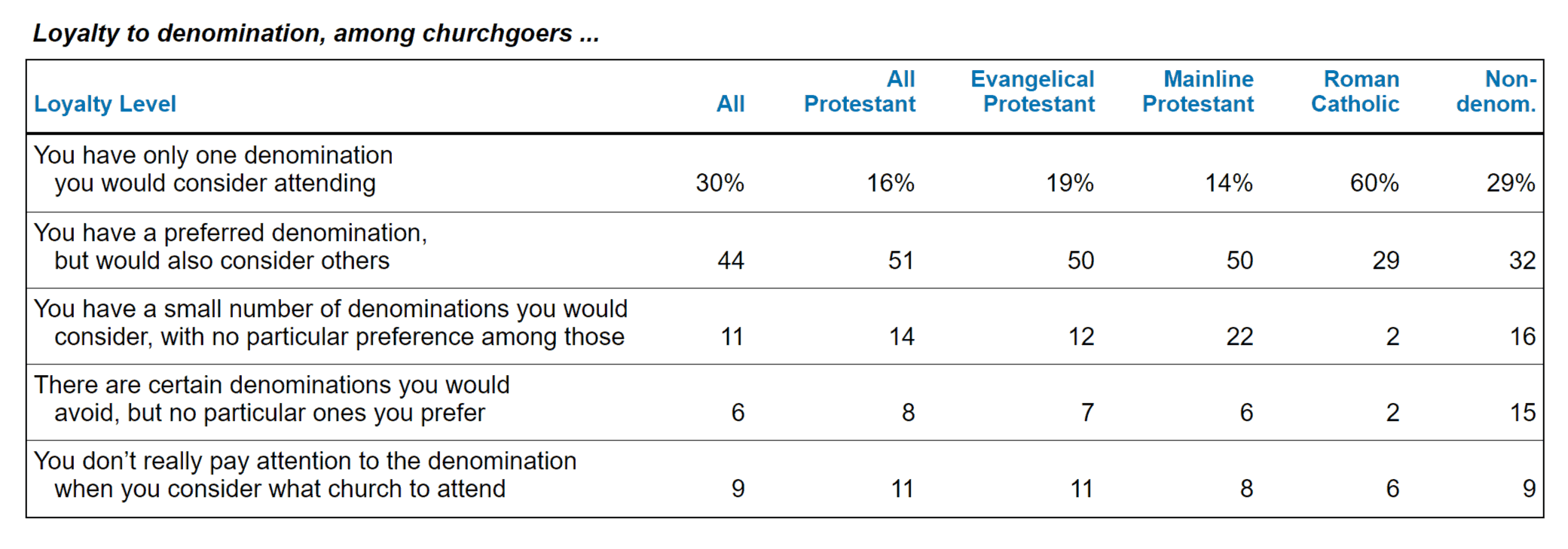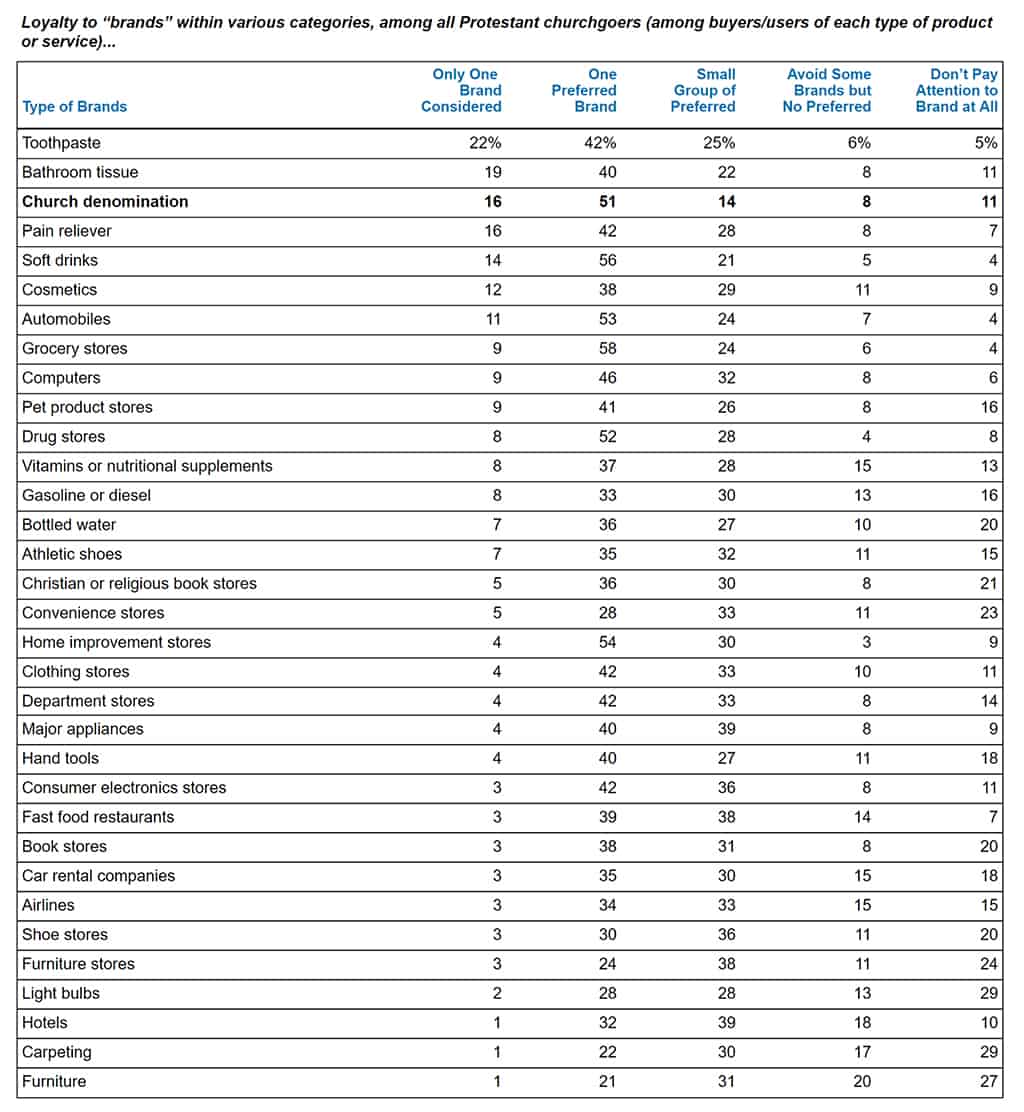Protestant churchgoers are no more loyal to their church denomination than they are to brands of toothpaste or bathroom tissue
(Original release date: January 12, 2009) Survey findings released from Grey Matter Research & Consulting (formerly Ellison Research) of Phoenix, Arizona show that seven out of ten regular churchgoers would be at least somewhat open to switching denominations, with dramatic differences between Protestants and Roman Catholics.
The findings are from a study independently designed and conducted by Grey Matter Research among a representative sample of 1,007 American adults. The sample is balanced by gender, age, income, race, and geography. The sample included 471 respondents who regularly attend worship services at a church broadly considered to be within the Christian tradition: Protestant, Roman Catholic, Mormon, and Orthodox.
Respondents who attend worship services once a month or more were first asked the specific denomination of the church they attend most often (for example, not just “Baptist,” but “Southern Baptist,” “Free Will Baptist,” etc.). Then they were asked what role that denomination would play if they could no longer attend their current church (if the church closed or if they moved to another area, for instance).
Three out of ten churchgoers say they would only consider attending one denomination – they would be open to nothing else. Another 44% report having one preferred denomination, but they would also consider others.
Eleven percent have a small number of denominations they would consider, with no particular favorite among them. Six percent don’t have any particular denomination they prefer, but they do have certain ones they would not consider. Finally, 9% say denomination does not factor into their decision of what church to attend.
Denominational loyalty differs strongly between Protestants and Catholics. Six out of ten active Catholics would only consider attending a Roman Catholic church, and another 29% prefer this, although they do not rule out other denominations. Eleven percent of Catholics do not show a specific preference for attending a Catholic parish.
In comparison, just 16% of Protestant churchgoers will only consider attending their current denomination. Fifty-one percent do express preference for one denomination, but would also consider others. Thirty-three percent do not have any preference for one specific denomination. This is little difference between the loyalties of people who attend evangelical Protestant churches and those who attend a mainline Protestant denomination.
Groups other than Catholic or Protestant, as well as individual Protestant denominations, represent a proportion of all churchgoers that is too small to analyze separately in the study findings (although their responses are included in the overall findings for all churchgoers).
There are relatively few demographic differences within the findings. Denominational loyalty does not vary significantly by gender, household income, age, or type of community (rural/small town, suburban, or urban). It does vary by race/ethnicity and by region of the country.
However, these differences are driven more by the Catholic/Protestant divide than by the actual demographics. Hispanic churchgoers – a majority of whom attend a Catholic church – are the most intensely loyal to their denomination, while African-Americans – relatively few of whom attend a Catholic church – are the least loyal.
Similarly, loyalty is highest in the Northeast, where Catholicism is more common than in any other part of the country, and lowest in the South, where Catholicism has less of a presence.
People who worship at a non-denominational congregation were asked the same question about their loyalty to attending a non-denominational church. People who attend a non-denominational church are actually more loyal to remaining non-denominational than churchgoers in Protestant denominations are to staying within their own denomination.
Among non-denominational churchgoers, 29% will only consider a non-denominational church, while 32% prefer a non-denominational congregation, but would also consider others. Sixteen percent have a small selection of denominations they would consider (including non-denominational) with no specific preference, 15% don’t have a specific preference but do have some denominations they would avoid, and 9% don’t pay attention to denomination when selecting a church.
Grey Matter Research also asked Americans about their loyalty to specific brands within 32 individual categories of products, services, and stores, such as automobiles, hotels, pain relievers, grocery stores, and airlines.
Roman Catholics are far more likely to be loyal to their denomination than they are to be loyal to specific brands within any of these consumer categories. The story is much different for Protestants.
Sixteen percent of Protestant churchgoers are exclusively loyal to one denomination, and a total of 67% have a preferred denomination (even if they will consider others). Types of consumer products or services that show similar levels of brand loyalty among Protestant churchgoers include:
- toothpaste (22% exclusive to one brand, with 64% expressing a brand preference)
- bathroom tissue (19% exclusive to one brand, with 59% expressing a brand preference)
- pain reliever (16% exclusive to one brand, with 57% expressing a brand preference)
- soft drinks (14% exclusive to one brand, with 70% expressing a brand preference)
- automobiles (11% exclusive to one brand, with 64% expressing a brand preference)
- grocery stores (9% exclusive to one brand, with 66% expressing a brand preference)
Protestants are more likely to be loyal to their denomination than they are to any specific brand of airline, athletic shoe, automobile, book store, bottled water, car rental company, carpet, clothing store, Christian/religious book store, computer, consumer electronics store, cosmetics, convenience store, department store, drug store, fast food restaurant, furniture, furniture store, gasoline/diesel, hand tools, home improvement store, hotel, light bulb, major appliance, pet product store, shoe store, and vitamin/nutritional supplement.
Ron Sellers, president of Grey Matter Research, pointed out that there may be much more to the story of the Protestant/Catholic loyalty divide than loyal Catholics and non-loyal Protestants. “It’s not as though there are two hundred different Roman Catholic denominations,” Sellers said. “On the Protestant side, there are scores of different denominations, with some of them fairly similar in practice and theology. The story of this research is that many Protestants may not see a lot of difference among some of these denominations. It may not be lack of loyalty so much as it is the presence of so many options that is causing Protestants to be about as loyal to a brand of toothpaste or bathroom tissue as they are to their church denomination.”
Sellers explained that for Catholic leaders, the findings are a good news/bad news scenario. “The good news for the Catholic church is that six out of ten Catholics will not even consider attending church in any other denomination, which is far higher than for Protestants. The bad news, of course, is that four out of ten active Catholics would at least be open to another denomination, even though most would prefer to remain in the Catholic church,” Sellers explained.
Protestant leaders face an entirely different situation. “Protestant denominations are simply facing what most companies face as they try to develop brand loyalty – consumers with many different options who may not perceive strong differences among those options. Church denominations certainly are not the same as hotels or soft drinks, but some of the same rules apply – the brands that develop stronger loyalty tend to do a better job of differentiating themselves from other brands and demonstrating key elements of the brand very clearly. With one-third of all Protestant churchgoers not even being able to identify a preferred denomination, denominational leaders face many of the same challenges as do the leaders of brands such as Coke, Chevrolet, or Home Depot,” Sellers said.
Study Details:
The study was conducted by Grey Matter Research & Consulting (formerly Ellison Research), a marketing research company located in Phoenix, Arizona. The sample of 471 churchgoing adults is accurate to within ±4.4 percentage points at the 95 percent confidence level with a 50 percent response distribution.
The study was conducted in all 50 states. Respondents’ age, household income, geography, racial or ethnic background, and gender were carefully tracked to ensure appropriate representation and accuracy.


